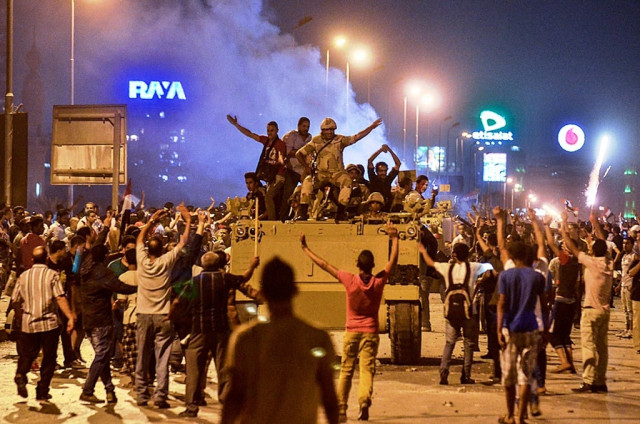Egypt orders arrest of Brotherhood leaders
It released 464 others who had been detained, on bail of about $300 each.

Protesters cheer upon the arrival of the Egyptian Security Forces during clashes between ousted president Mohammed Morsi supporters and anti Morsi protesters near Egypt's landmark Tahrir square on July 5, 2013 in Cairo, Egypt. PHOTO: AFP/FILE
A week after the army toppled Egypt's first democratically elected leader, bloodshed has opened deep fissures in the Arab world's most populous country, with bitterness at levels unseen in its modern history.
Brotherhood spokesman Gehad El-Haddad said the announcement of charges against leader Mohamed Badie and several other senior leaders was a bid by the authorities to break up a vigil by thousands of Mursi supporters demanding his reinstatement.
This week's unrest has alarmed Western donors and Israel, which has a 1979 peace treaty with Egypt.
Washington, treading a careful line, has neither welcomed Mursi's removal nor denounced it as a "coup".
Under the Untied States (US) law, a coup would require the US to halt aid, including the $1.3 billion it gives the army each year.
The Brotherhood's downfall has, however, been warmly welcomed by three of the rich Arab monarchies of the Gulf, who showered Cairo with aid to prop up the collapsing economy.
Kuwait promised Egypt $4 billion in cash, loans and fuel on Wednesday, a day after Saudi Arabia pledged $5 billion and the United Arab Emirates offered $3 billion.
The Brotherhood leaders were charged with inciting violence in Monday's shootings, which began before dawn, when the Brotherhood says its followers were peacefully praying.
The army says that ‘terrorists’ provoked the shooting by attacking its troops.
According to security sources, 57 people died including 53 protesters and four members of the security forces.
Haddad said that the Brotherhood leaders had not been arrested and some were still attending the protest vigil at Rabaa Adawiya mosque. The charges against them were "nothing more than an attempt by the police state to dismantle the Rabaa protest".
"What can we do?" he asked. "In a police state, when the police force are criminals, the judiciary are traitors and the investigators are the fabricators, what can one do?"
In addition to Badie, prosecutors ordered the arrest of others including his deputy, Mahmoud Ezzat, and outspoken party leaders Essam El-Erian and Mohamed El-Beltagi. Khairat El-Shater, another senior leader, was held last week.
The prosecutor also ordered 206 Brotherhood activists arrested after Monday's violence to be detained for a further 15 days on accusations of involvement in the killings.
It released 464 others who had been detained, on bail of about $300 each.
Ramazan Overshadowed
Egyptians have hoped that the start of Ramazan, the Muslim fasting month, would cool passions, but it has been overshadowed by rancour.
Thousands of Brotherhood supporters braved the brutal summer heat to maintain their outdoor protest vigil despite the fast, clustering in tents to protect themselves from the sun during day hours when Islam forbids all eating or drinking.
Some milled about, others staged small marches. A list was posted at the camp bearing the names of the more than 650 people arrested following Monday's ‘massacre.’ They would not budge until Mursi was restored to power, they said.
"He'll come back," said Reda Ibrahim, a 43-year-old Mursi supporter who came from the Suez Canal city of Ismailia. "He'll finish his term."
Despite the violence that followed Mursi's removal, the interim authorities are proceeding with the army's ‘road map’ to restore civilian rule. On Tuesday, they named 76-year-old economist Hazem el-Beblawi as acting prime minister.
Beblawi told Reuters he would start selecting ministers and would begin by meeting liberal politicians Mohamed ElBaradei and Ziad Bahaa el-Din. ElBaradei, a former U.N. agency chief, has been named vice president.
Bahaa el-Din, a former head of Egypt's investment authority, has been touted for senior posts. Both are prominent figures in the National Salvation Front, the main secularist group that led protests against Mursi.
They also support a stalled $4.8 billion loan deal with the International Monetary Fund, which would require Egypt to make politically painful reforms to subsidies for food and fuel that support its 84 million people but drain its public finances.
Beblawi accepted that it would be a challenge to find a cabinet line-up with universal support. "I don't believe that anything can have unanimous approval," he said.
Beblawi has indicated he would be open to offering cabinet posts to the Mursi’s supporters, including Brotherhood figures. The Brotherhood says it will have nothing whatsoever to do with a government of what it calls a "fascist coup".
Coup or No?
Both sides of Egypt's divide have become fiercely anti-American. Mursi's opponents say President Barack Obama's administration supported the Brotherhood in power, while Mursi's supporters believe Washington was behind the plot to unseat him.
Secularist posters depict the U.S. president as a bearded Brotherhood member and call Cairo ambassador Anne Patterson - who spoke against street protests against Mursi - a "witch".
For Mursi’s supporters, Obama's refusal so far to label the military takeover a "coup" showed that he was a hypocrite in promoting democracy.
White House spokesman Jay Carney, who voiced confidence in the ambassador, said it was still too soon to conclude whether the takeover was a coup: "We are evaluating how the authorities are responding to and handling the current situation," he said.
But aid had not been suspended. The Pentagon said a planned delivery of four F-16 fighters to Egypt would take place soon.
The promised $12 billion in aid from the Gulf states would go a long way to easing a deep economic crisis that has driven Egypt's finances to the brink during two and a half years of instability since autocrat Hosni Mubarak was swept from power.
The funds also reduce the incentive for Egypt to make the reforms the IMF says are needed to stabilise public finances, attract investment and rekindle economic growth.
In other steps on their "road map", the authorities have announced a temporary constitution, plans to amend it, and a timetable for elections beginning in about six months.
Those moves already demonstrated difficulty in achieving political consensus, even among Mursi's opponents. The secularist NSF initially rejected the interim constitution, as did Islamists and others, although on Wednesday the NSF withdrew its rejection and issued a new, milder criticism.
On Wednesday, the authorities also named a chief prosecutor, replacing Mursi's appointee who was pushed out last week by a court that briefly reinstated his Mubarak-era predecessor.
With the Brotherhood sidelined, the authorities are courting the second largest group, the ultra-orthodox Nour Party, to demonstrate that democratic groups will not be suppressed as they were during six decades of military-backed rule.
Nour officially withdrew from politics in response to Monday's violence but has said that it did not object to Beblawi's appointment and will assist his government.
Nour spokesman Nader Bakkar said on Wednesday that the group would not accept posts in the new cabinet but would offer "consent and advice to help the cabinet pass through the transition period as soon as possible and with minimum damage".
"We are waiting to help. We are ready to advise but for the time being we still take the decision not to participate in the political process until the judiciary committee gives its report about what happened," he said of this week's shooting deaths.
Bloodshed has abated since Monday's incident, the deadliest since Mubarak's fall, apart from a 2012 soccer stadium riot.
However, there are fears that the political violence could lead to a breakdown in security, especially in the lawless Sinai peninsula region bordering Israel. Two people were killed and six wounded overnight when Islamist militants attacked a Sinai checkpoint.



















COMMENTS
Comments are moderated and generally will be posted if they are on-topic and not abusive.
For more information, please see our Comments FAQ